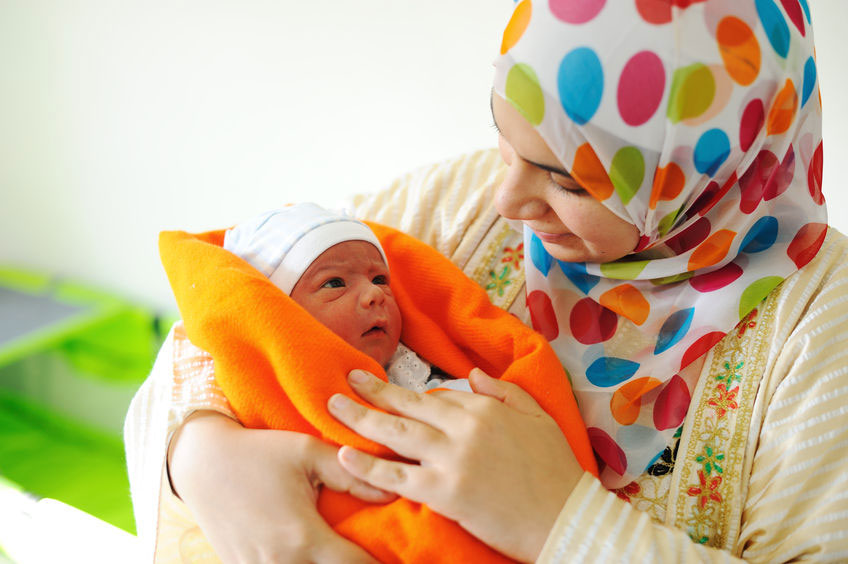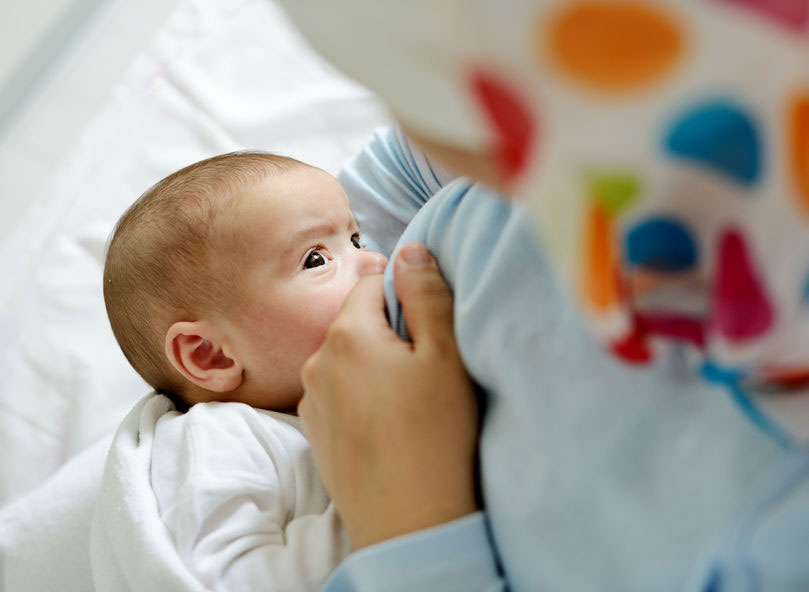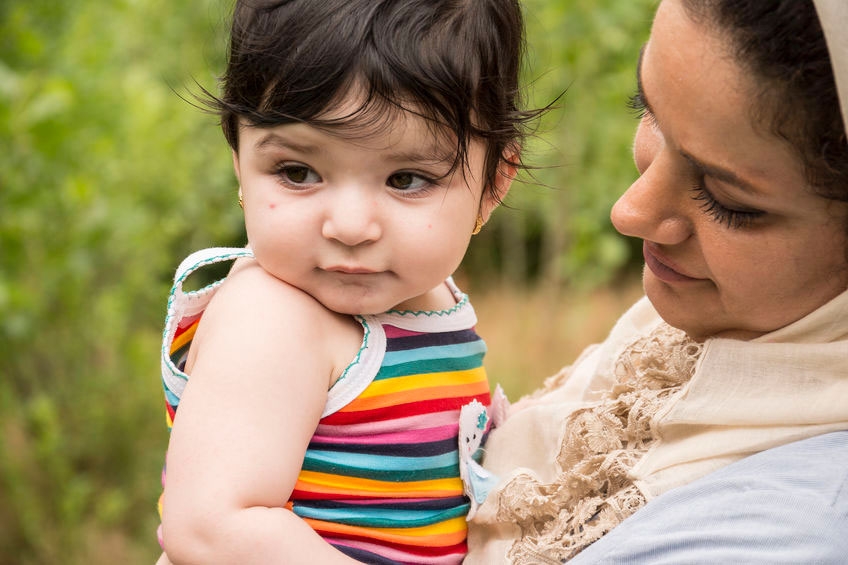During the month of Ramadan, Islamic religion involves fasting (not eating or drinking) from sunrise until sunset. Does a breastfeeding mother have to fast? Is fasting safe for a nursing mother and baby? This article answers frequently asked questions around fasting and breastfeeding during Ramadan.
Does a breastfeeding mother have to fast?
According to Islamic Law breastfeeding mothers do not have to fast. Dr Rahmat Bibi Bagus, a doctor and International Board Certified Lactation Consultant states:
Allah has bestowed a grace on breastfeeding mothers to not fast, if they are concerned for the wellbeing of their child or are worried about their own health and wellbeing. It is wrong to ignore this kindness by fasting when she does not have to. However, if she feels well and has no concerns regarding her own or her baby’s health then she is to complete her fard duty of fasting.
Does a breastfeeding mother have to make up missed fasts?
Breastfeeding mothers who choose not to fast can make up any missed fasts at a later date or compensate by feeding someone in need. The following article explains:
[…] pregnant and breastfeeding mothers are exempt from fasting according to the Hadith [sayings of the Prophet].
Some cultures interpret the Hadith very generally and will not fast at all if breastfeeding. In other cases and in Arab cultures in particular, mothers will only miss fasts in cases of hardship. They will often continue to fast during breastfeeding unless it has a negative effect on them or their babies. If they do not fast at the appropriate time, they will have to “pay back” the fast when they are able. Some mothers with children spaced very close together will choose to make up the fast after all of their children have weaned. Some scholars say that instead of making up the fasts, these mothers can pay a compensation by feeding poor people a meal for the number of fasts missed [fidyah].
Abu Khadeejah Abdul-Wahid, director of As-Salafi Mosque in Birmingham summarises evidence from various scholars regarding how to compensate for missed fasts and concludes:
The stronger position and Allah knows best, is that [the mother] only needs to feed a poor person for each day she missed due to pregnancy or breastfeeding.

How can a breastfeeding mother decide whether to fast or not?
Although not obligated to do so, some breastfeeding mothers may prefer to fast or do a partial fast with the rest of the family rather than fasting at a later date. There are a number of considerations to be aware of when deciding whether to fast while nursing.
Age of the baby
An article by Dr Naomi Mirza on breastfeeding during Ramadan notes that one of the most important considerations in deciding whether to fast or not is the age of the baby and whether the nursling is still exclusively breastfeeding and completely dependent on breastmilk:
An important factor to consider when you are thinking of fasting is the age of your baby. If your baby is still very young (less than six months) and is completely dependent on breast milk, then you should not fast. If your baby is more than a year old, already on complementary foods and drinks breast milk only a few times a day, or only during bedtime, then you may be able to fast with little or no discomfort.
If a mother wants to fast while her baby is exclusively breastfed, the Hamad Medical Corporation 1 caution that the mother should discuss this with her health professional first. They recommend the mother stays cool, well rested and hydrated and that she watch her baby for any signs he is not getting enough milk.
Mother and baby’s health
If a mother has health conditions that make breastfeeding or fasting difficult or if she has a low milk supply, or if her child is underweight, poorly, or premature it is preferable not to fast. In a book about breastfeeding during Ramadan, author Latonia Anthony cautions against fasting in all the following circumstances:
Women who have a baby less than six months old (whom make almost 1 litre of breast milk a day), live in hot climates, are low income, tandem nurse, have multiples e.g. twins and who are older than 35 years are most at risk of severe dehydration and should not fast until weaning has occurred. The same goes for women who have confirmed low milk supply, must supplement, have a child that is underweight (preemies) or ill, take medications or have health conditions that make it difficult to breastfeed. If a mother really wants to fast, she can do partial fasting—committing to two to three days a week.
Partial fasting
Latonia Anthony mentions partial fasting two to three days week may be a possibility in some situations if a mother really wants to fast (see excerpt in previous section).
How can fasting affect breast milk?
The intermittent style of fasting during Ramadan can usually provide enough time for a healthy well-nourished mother to eat and drink between dusk and dawn. Intermittent fasting is not thought to be associated with decreasing milk supply 2 or a change in the major nutrient composition (fat, carbohydrate, protein) of breast milk 3. However intermittent fasting may affect the micronutrients (vitamins and minerals) in breast milk. Rakicioğlu et al explain:
Ramadan fasting had no significant effect on the macronutrient composition of the breast milk and consequently the growth of the infants. There were significant differences in some of the micronutrients such as zinc, magnesium and potassium. The nutritional status of lactating women was affected by Ramadan fasting. All of the nutrient intakes (except vitamins A, E and C) decreased during Ramadan. For these reasons, it would seem prudent to excuse lactating women from fasting during Ramadan.


Are there any tips for fasting while breastfeeding?
Stay well hydrated and nourished
Mothers who feel able to fast while breastfeeding are advised to drink plenty of water to stay well hydrated and to be sure to eat enough nutritious food between sunset and dawn (LLLI, 2015). It is important not to miss the pre-dawn meal (suhoor). Dr Rahmat Bibi Bagus recommends eating plenty of protein-rich foods such as eggs, yoghurt, nuts, seeds, and nut-butters and slowly digesting, complex carbohydrates like barley, bran, oats, beans and lentils. She adds that fruit and dates are also good options pointing out that dates are thought to help a milk supply.45
Rest as much as possible
Fasting may cause a mother to feel very tired so mothers are advised to rest as much as possible during this time to conserve energy.
Know signs of dehydration
A breastfeeding mother could be at risk of dehydration during fasting in the month of Ramadan particularly in certain climates. To avoid this it is important to stay cool, drink plenty and get plenty of rest. Severe dehydration needs urgent medical treatment and may reduce milk supply. Warning signs for dehydration from the Hamad Medical Corporation include:
If a fasting lactating woman begins to notice any signs of dehydration (feeling very thirsty, dizzy, weak, very tired, fainting, having a severe headache, passing dark-colored strong smelling urine) she should break her fast by taking sweet fruit juice or salt-water solution and rest. If she still feels unwell after 30 minutes, she should consult her doctor.
Islam doesn’t require you to make yourself ill when you fast.
Watch baby for ill effects
During fasting, a breastfeeding mother may need to breastfeed more often to maintain her milk supply (Bagus, 2024). Parents should check with their baby’s health care provider if they have any concerns their baby might not be getting enough breast milk during fasting and be aware of ways to increase their milk supply. The International Baby Food Action Network lists signs to look out for:
Effects on the baby: breastfeeding mother should stop fasting and immediately contact her Health Care Provider if any of the following symptoms appeared on her baby:
- Not gaining enough weight or has lost weight.
- Not satisfied after the feeding possibly crying for another feed soon after.
- Fewer wet and dirty nappies.
- Seems generally unsettled, fussy, cries constantly (no tears).
- Green-colored scanty stool.
- Sunken anterior fontanelle.
- Cold, blotchy hands and feet.
Summary
Breastfeeding mothers are exempt from fasting during Ramadan. The fast can be made up at a later date or by feeding a poor person for each day of the fast. However, if a mother feels fasting would be manageable for her and wouldn’t affect her own or her baby’s health, she may choose to fast or do partial fasting.